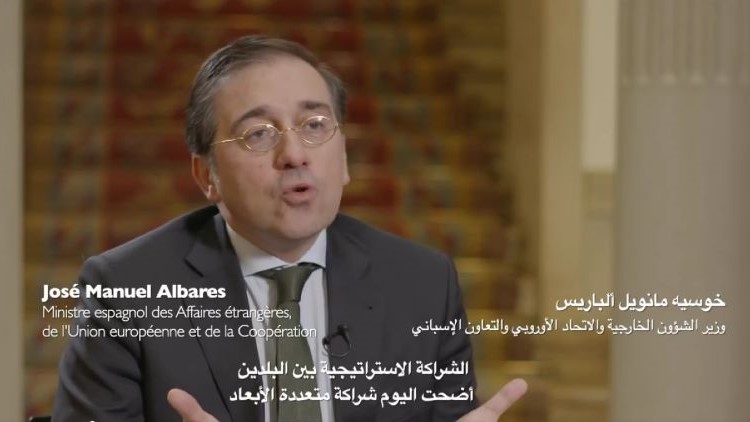Eduardo González
The appearance of the President of the Government, Pedro Sánchez, before the European Parliament in Strasbourg to take stock of the Spanish Presidency of the EU ended in a tough dialectical confrontation with the leader of the European People’s Party (EPP), Manfred Weber, on account of the controversial amnesty law.
During his speech before the plenary session, Sánchez listed a series of achievements during the Spanish Presidency, such as the approval of “43 highly relevant files, a quantity higher than the usual average”, the creation of “new economic security instruments that will protect us from coercion by third countries and that will guarantee the free movement of goods, services and people in times of crisis within the Single Market” or the celebration of “a historic Summit between the EU and Latin America and the Caribbean.”
He also mentioned the approval of the Nature Restoration Law, the celebration of the Tripartite Social Summit, the progress in the reform of the electricity market, the implementation of the Disability Card, the development of new directives to combat violence against women and human trafficking, progress in the Migration and Asylum Pact, the parliamentary agreement on the reform of the Treaties or substantial progress in terms of enlargement.
Likewise, Pedro Sánchez recalled that Spain began the Spanish Presidency of the EU Council in Kyiv and that the twenty-seven have shown “clarity and unity” in the face of Putin’s illegal invasion, and asked for that same “unity” to “condemn the repugnant murders and kidnappings perpetrated by Hamas, support the fight against terrorism throughout the Middle East and recognize Israel’s right to defend itself and exist” and, at the same time, “say enough to the death of innocent civilians in Gaza, including thousands of children ”.
The amnesty law
During the groups’ replies, as expected, questions of Spanish internal politics arose, and not only from the Spanish MEPs. In this regard, Dolors Montserrat (PPE) addressed Sánchez to tell him, “from a Spanish Catalan to a Spaniard,” what “millions of Spaniards would like to say to his face: Spain says no to an amnesty, to a coup against democracy“. “Sánchez’s amnesty is selling Spain’s activity for seven votes to govern,” he continued, addressing the Chamber.
For his part, the leader of the European People’s Party (EPP), the German Manfred Weber, questioned the successes of the Spanish Presidency and warned that “if the (European) Council fails this week at this historic moment, it will also be a “Sánchez’s failure.” Likewise, he harshly criticized the amnesty law: “You cannot promise that you will not give an amnesty three days before, you cannot be in power for five years saying that an amnesty is not constitutional and then applaud that amnesty,” he asserted.
In his turn to respond, Pedro Sánchez affirmed that the amnesty law “is an important step in the right direction” because it has the support of “a large majority of our Parliament”, it is “constitutional” and “it only pursues one goal: overcome a conflict and help sow harmony among our compatriots.”
Manfred Weber
Likewise, he was particularly harsh with the German MEP: “I, truly, I am glad that after twenty years in this Chamber you have begun to take an interest in what is happening in Spain, but if you really wanted to help, my recommendation, Mr. Weber, is that you get to know our country first and not limit yourself to repeating the unfounded proclamations that your colleagues from the Spanish Popular Party pass on to you.”
“Tell me, Mr. Weber, do you know who the allies of the Popular Party in Spain are? Do you know what Vox represents and what it really thinks? Do you know how Vox defines the European Union? I quote him verbatim: he defines it as ‘a mega federal state similar to the Soviet Union,'” he continued. “Do you know what they are referring to or how they are referring to community institutions? I quote them verbatim: ‘degenerate oligarchies that want to turn entire nations into multicultural dunghills,’” he added. “Are you in favor of these anti-European statements, Mr. Weber? Because they are contrary to a federal State, by the way, very similar to the federal State that you have in Germany,” he asked him.
“And what do you think of Vox’s proposal to outlaw certain political parties, to prevent critical media from accessing media appearances? Does it seem democratic to you?” Sánchez continued. “Do you know that they are censoring concerts, films and plays, while at the same time they are recovering the names on the streets of our cities of famous people linked to the Franco dictatorship? Would that also be your plan for Germany, Mr. Weber? “Return the names of the leaders of the Third Reich to the streets and squares of Berlin?” he added.
“The real threat in Spain and in Europe is the advance of the extreme right and also, if you allow me, the irresponsibility of the traditional right that are opening the doors to coalition governments and are adopting many of their ideas,” Pedro Sánchez assured. “That is the threat that hangs over the European project. “This reactionary tandem weakens, Mr. Weber, the European project,” he added.
“Spain, ladies and gentlemen, is a democracy, it is a full democracy. We are a European country, as is its Government. Spain has a robust rule of law, an absolutely legitimate and capable Government. And I invite you not to be confused as an adversary. The European right has already made that mistake in the past and Europe paid dearly for it,” he concluded.







